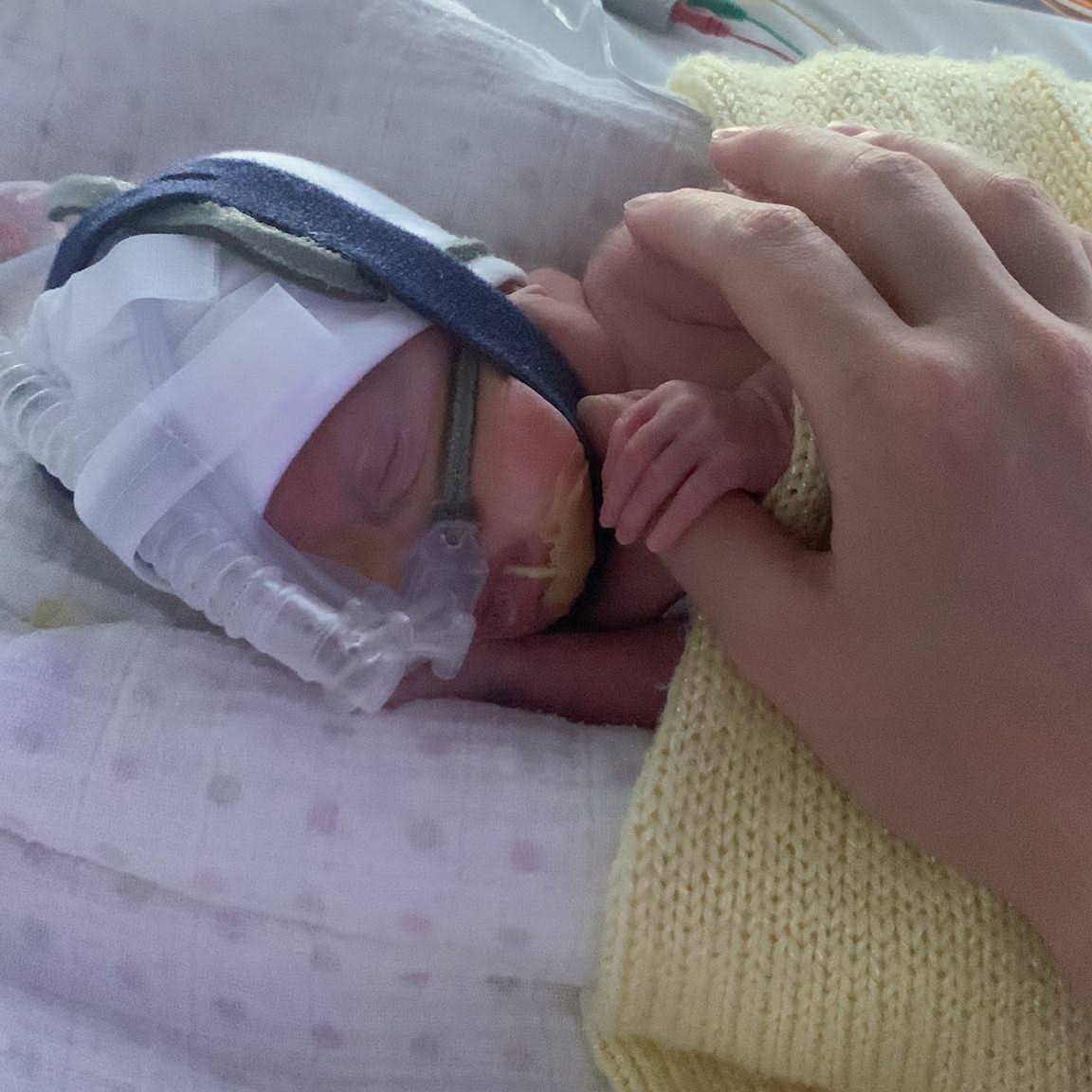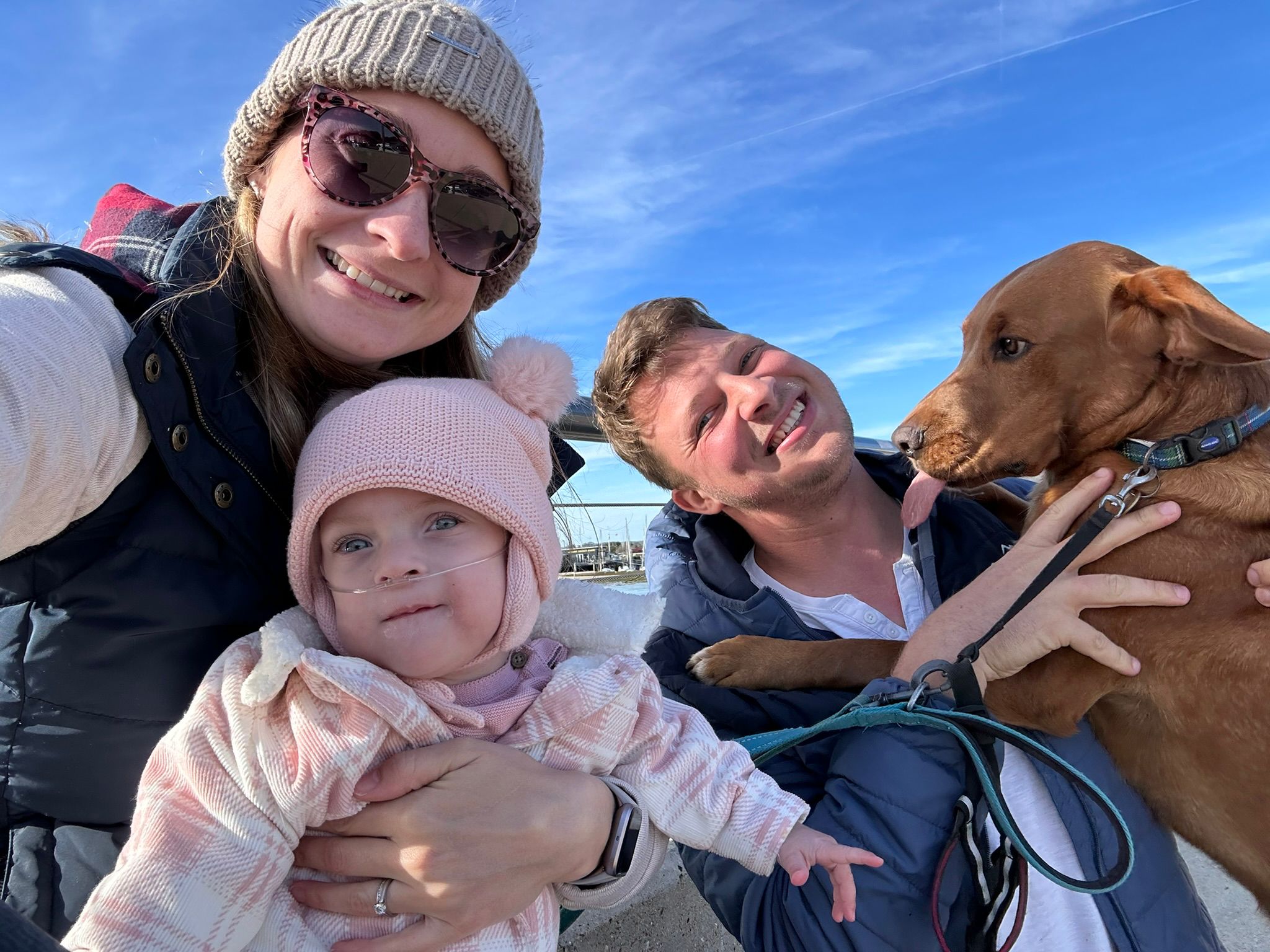We were told Elsie’s chance of survival was 1000 to 1 and she made it – she’s amazing
My name’s Chris and my wife’s name is Debi. We were trying for about 2 years to have a baby, and our first heartbreak came when we sadly had an ectopic pregnancy. We were really struggling to conceive again, but eventually managed to get pregnant with our little girl, Elsie. We were so happy, but when she came along it was a bit tricky for everyone, especially for her…
We had no warning at all when, around the 23 week mark, my wife’s waters broke unexpectedly.
Having Elsie at 23 weeks
From the start, Debi’s pregnancy had been classed as high risk due to her older sister giving birth prematurely during her pregnancies. Despite this, when we called our local hospital with concerns after Debi lost her mucus plug and was leaking fluids around the 23 week mark, our concerns were initially dismissed and she wasn’t seen. We felt a little bit let down as they were actually quite patronising, asking if she was a first-time mother as if to imply she was worrying over nothing. It turns out she had a really just cause.
We did go into hospital at 23 weeks and 4 days, and thank goodness we did – there was an infection and Debi’s waters had broken early. What we don’t know is whether the waters breaking caused the infection to mum and baby that meant Elsie needed to be born straight away or if the infection came first and caused the waters to break.
We’ve been told to be prepared to never know why Elsie came so early, which is really difficult.
Elsie was born by emergency c-section at 23+5. When she was born, she weighed just 600g and was approximately the size of an iPhone. We were told Elsie’s chance of survival was 1000 to 1 and she made it – she’s amazing.
The NICU journey
After she was born, she was taken straight to the neonatal intensive care unit (NICU) and that’s where she stayed for the next 211 days. This was an incredibly difficult journey, for all of us.
There were about 4 occasions when we were told we would lose her, or certainly that we could lose her, but she pulled through.
Because we lived quite far from the hospital, a charity provided us with accommodation right by it – meaning we were literally living at the hospital for those first 8 months or so Elsie was in there. I don’t know how we would’ve got by without this.

Elsie’s been through the wars so much for such a little thing. She had her first surgery at just 10 days old, after a feeding tube caused a perforation in her stomach.
She’s had a number of quite complex conditions because of being born so early, the most prominent one is that she has a severe chronic lung disease. She also had left ventricular hypertrophy – a thickening of her heart muscle, and a rare complication caused by the steroids given to save her life – along with ROP detachment of the retina, an eye disease affecting premature babies, which required surgery to repair.
Balancing NICU and ‘normal’ life
In amongst all of this, one of the hardest things was having to leave the world of the hospital to go back out into the ‘real world’. Even with Elsie in her condition, paternity leave meant I only had 2 weeks off before I had to go back to work. It wasn’t what either of us wanted, but we had bills to pay and had to keep money coming in.
Managing those 2 worlds was really difficult. Out in the real world, people walk quicker, talk quicker, and no one knows what you’re going through. I felt like I needed to hang a sign round my neck saying ‘I’m not in your world, I’m in a really fragile place’!
It would be a fairly normal working day and meanwhile I was living at the hospital and my daughter was fighting for her life – it was a really tough time.
Because it was so difficult navigating these two worlds, I actually decided to start my own support group for dads and partners. I’d found it was predominantly women, mums, posting on the support groups we joined on social media so it wasn’t as easy to connect with other dads going through a similar experience. The people were lovely, and it’s obviously hugely difficult for mums in this situation, but we face our own unique challenges so I was looking for some other dads to talk to.
I started a WhatsApp group with lots of other dads on it which is still going today. We’re there for each other, chat and just help each other out really. It sounds obvious, but I think talking is one of the most important things when it comes to coping with the NICU experience. Even with the best friends and family in the world, this situation has a way of making you feel very, very alone.
Making it through the NICU journey
We’ve had a real hell of a journey, there isn’t any way to sugar-coat that, but I have found that seemingly small things can make a very big difference.
Sometimes, this came from surprising places. Since birth, Elsie had a number of respiratory aids including CPAP, which is like a mask, and on the unit there was only one soother available specially designed for premature babies to fit around their breathing aids. I wanted to buy more because Elsie found so much comfort from it, but you can’t buy them in shops because they’re classed as a medical aid. I wrote to MAM, who made them, and they not only sent soothers for the whole unit but also stayed in touch with us regularly to see how Elsie was doing. It meant a lot. They showed us friendship and kindness at a time where you feel very alone. It made a real, positive difference to a very horrible and traumatic time.
People say to me and my wife now, ‘I don’t know how you did it’ and the fact is, we didn’t have a choice. That’s why I find it hard to give advice to other parents – you just have to go through it, no matter how awful it is, because there’s no alternative.
There’s a big question mark around if we were to try for another child at another point in our lives, especially not knowing what caused Debi to go into labour so early. Would it happen again? We both feel like we missed out on a lot and were robbed of so many experiences that other parents get to have during pregnancy and birth, but at the same time we couldn’t go through this whole process again.
Looking to the future
Now she’s out of hospital and doing great for the most part. There are still some hurdles to cross. Elsie has an adrenal gland insufficiency which means that she finds it very difficult to recover from illnesses. Something as simple as a common cold can put her in hospital and generally means a stay in there where she’ll have to have additional respiratory support. We have to be really careful with her as she’s very vulnerable which brings additional challenges to us as a family. We can’t just put her in nursery, or have anyone look after her who isn’t medically trained. We just don’t leave her at all.
It's not always easy, but every day she’s getting a little bit bigger and a little bit stronger. Life is slowly returning back to normal – or, more accurately, we’ve kind of redefined what normal is for us.

Tommy’s National Centre for Preterm Birth Research
We’re opening the Tommy’s National Centre for Preterm Birth Research dedicated to finding the causes and treatments which save babies’ lives.
Together we can bring hope to thousands more families across the UK.
